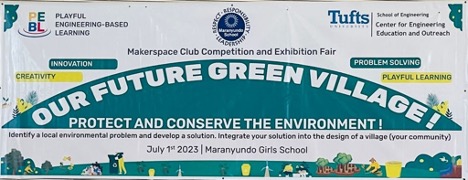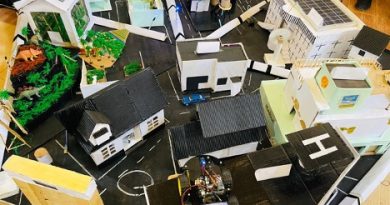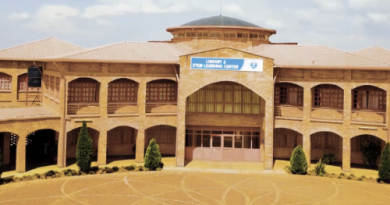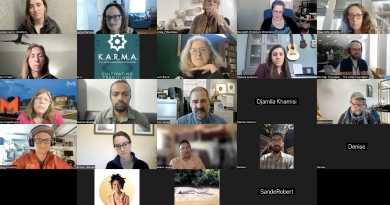Rwandan Tufts Students Return Home to Inspire Young Makers
Tufts Center for Engineering Education and Outreach (CEEO) found success with a new model of international collaboration as part of the LEGO Foundation Playful Engineering-Based Learning (PEBL) project. CEEO enlisted the help of two Rwandan undergraduate students at Tufts to help Rwandan teachers and inspire their students.
Through PEBL, Tufts CEEO supported a number of different organizations that do engineering outreach in their communities. The work in Rwanda was a collaboration with the Maranyundo Initiative, a Massachusetts organization that built the Maranyundo Girls School (MGS), one of Rwanda’s top schools for girls in grades 7-12. MGS has an outstanding makerspace, and the girls have won many makerspaces competitions. The goal of PEBL was to start similar makerspaces in 20 more schools and to train 40 teachers to implement playful engineering learning.
Tufts CEEO supported this goal by co-designing a teacher training with the project lead Djamila Khamisi. To support Khamisi further, Tufts CEEO sought the help of the Tufts International Center to identify Tufts students from Rwanda. As a result, Jean Pascal Cyusa Shyaka, a sophomore majoring in Mechanical Engineering, and Noëlla Akuzwe, a junior majoring in Computer Science with a minor in Economics, joined CEEO. The pair were hired to develop resources to help teachers and students in Rwanda.
Both students were new to Arduino, the microcontroller used in the secondary school makerspaces, so they spent much of the spring semester learning how to use the microcontroller with various sensors and motors. Once they were up-to-speed with the technology, they began designing challenges for the students that were relevant and engaging to Rwandan students. A virtual presentation by two Rwandan teachers proved especially inspirational as the teachers showed off some of the remarkable designs their students were working on in their maker clubs, like an egg incubator designed to keep an egg at a perfect temperature.
At the end of the spring semester, the students flew home to Rwanda to stay with their families while continuing their work in person. A major milestone of the Rwandan PEBL project was Our Future Green Village, a makerspace competition for all 20 schools to identify an environmental problem and design a solution. Azukwe and Shyaka assisted Khamisi in preparing for the competition by creating a detailed timeline of the events leading up to the competition. Since they were from the area, they were able to source and deliver all the necessary materials to each school.

While visiting the schools, Azukwe and Shyaka worked directly with the students, helping them with their projects. The students were excited to meet the Tufts undergraduates, and the pair were equally excited to see the curiosity and creativity of the students. In addition to working with students, the pair showed some new teachers how to use the technology.
The competition was a resounding success, with over 500 attendees and impressive designs in which maker clubs worked together to build models of entire villages.
After the competition, the Tufts students returned to campus and continued to develop resources for the students back in Rwanda, including a series of YouTube videos using Arduino, complete with captions in Kinyarwanda. Their work in Rwanda not only provided a great service to the students and teachers back in Rwanda, but it also had a significant impact on each of the undergraduates.
I had never imagined myself as an educator before joining the CEEO. After spending these last 8 weeks working with Djamilla Khamisi and the Maranyundo Girls School to help makerspace clubs in more than 20 schools, I experienced firsthand how sharing what you’ve learned with others is a good way to give back to your community and help a lot of students who were once in your shoes carve a bright future for themselves. It was seeing those bright smiles from middle school students and the curiosity that they showed during our visits that I realized how important it is for children to have such an opportunity to express their ideas, not just in classrooms, but outside the classroom as well; something makerspaces have helped them develop.
Jean Pascal Cyusa Shyaka
Aside from the experience of getting a tour of Bugesera while visiting schools there, it was very inspiring to witness some of the projects the students had been working on in their makerspaces. It was amazing how they identified problems around them and built solutions using available resources, which mainly included recycled materials. Some of their teachers were as amazed by their students’ creativity as we were. Additionally, witnessing part of the process those students went through inspired me to stay curious about learning, making, and solving problems in my community.
noëLla Akuzwe




